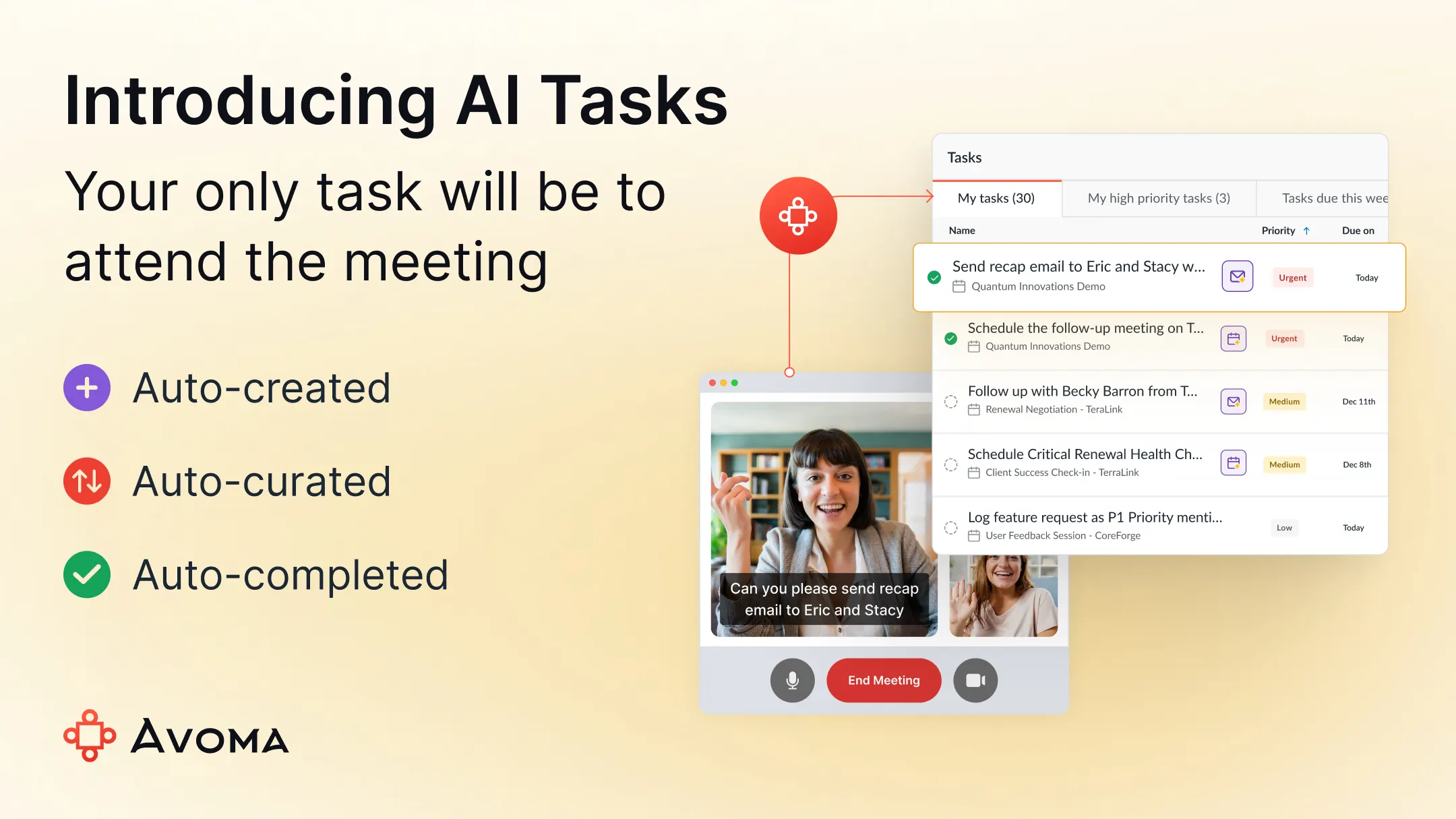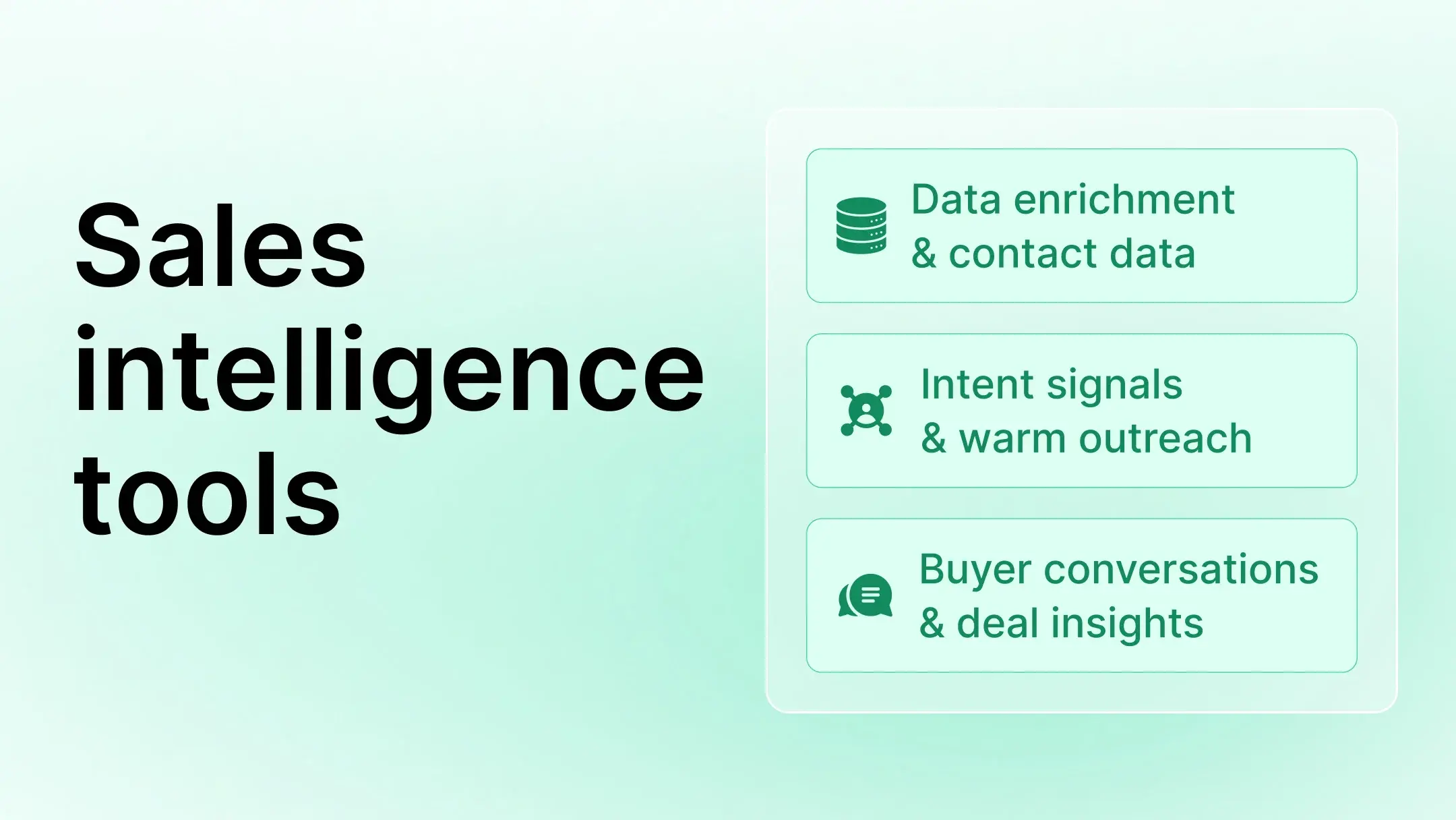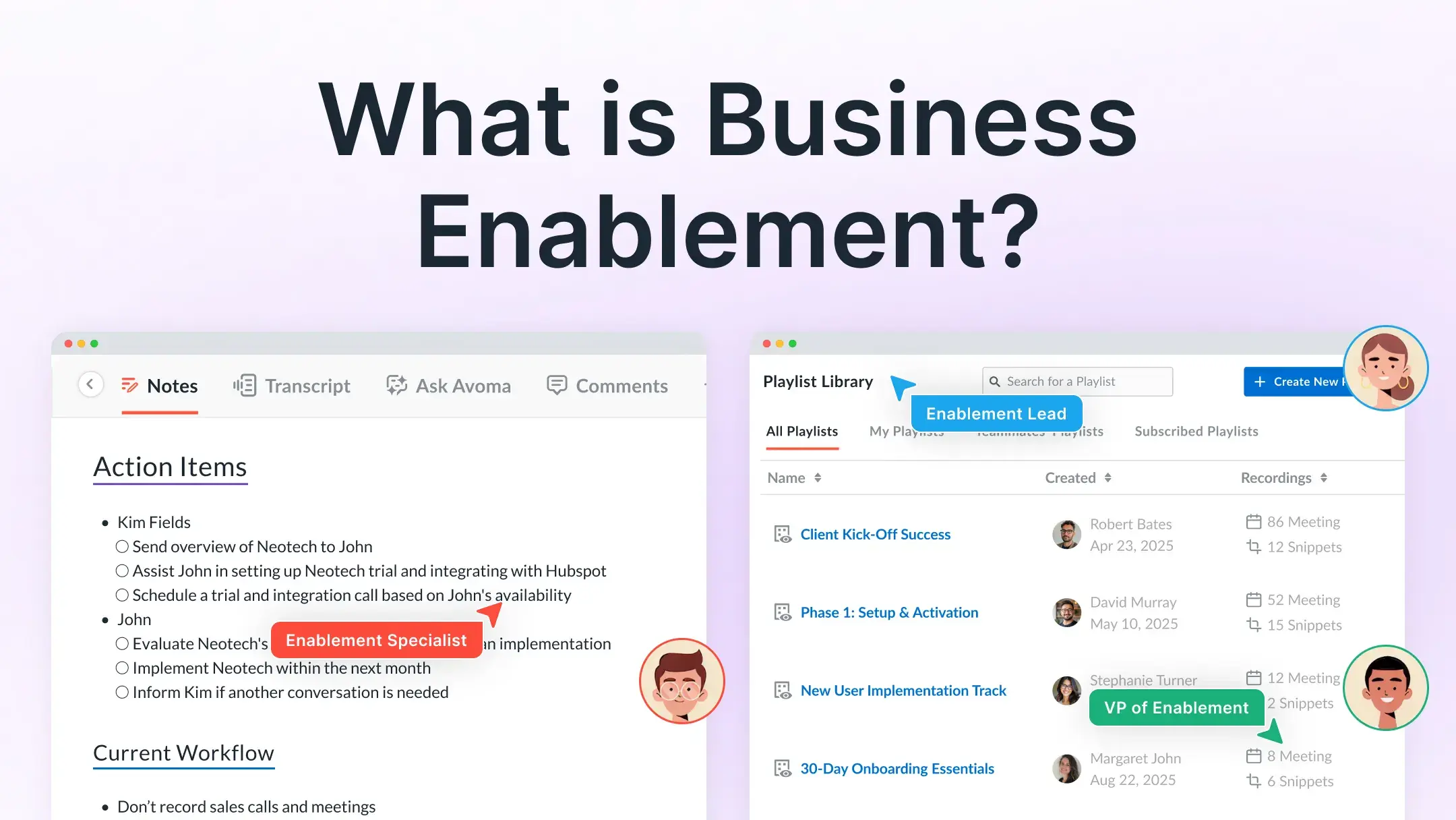Otter vs Fireflies: Features, pricing, scalability, what really matters
Table of Contents:
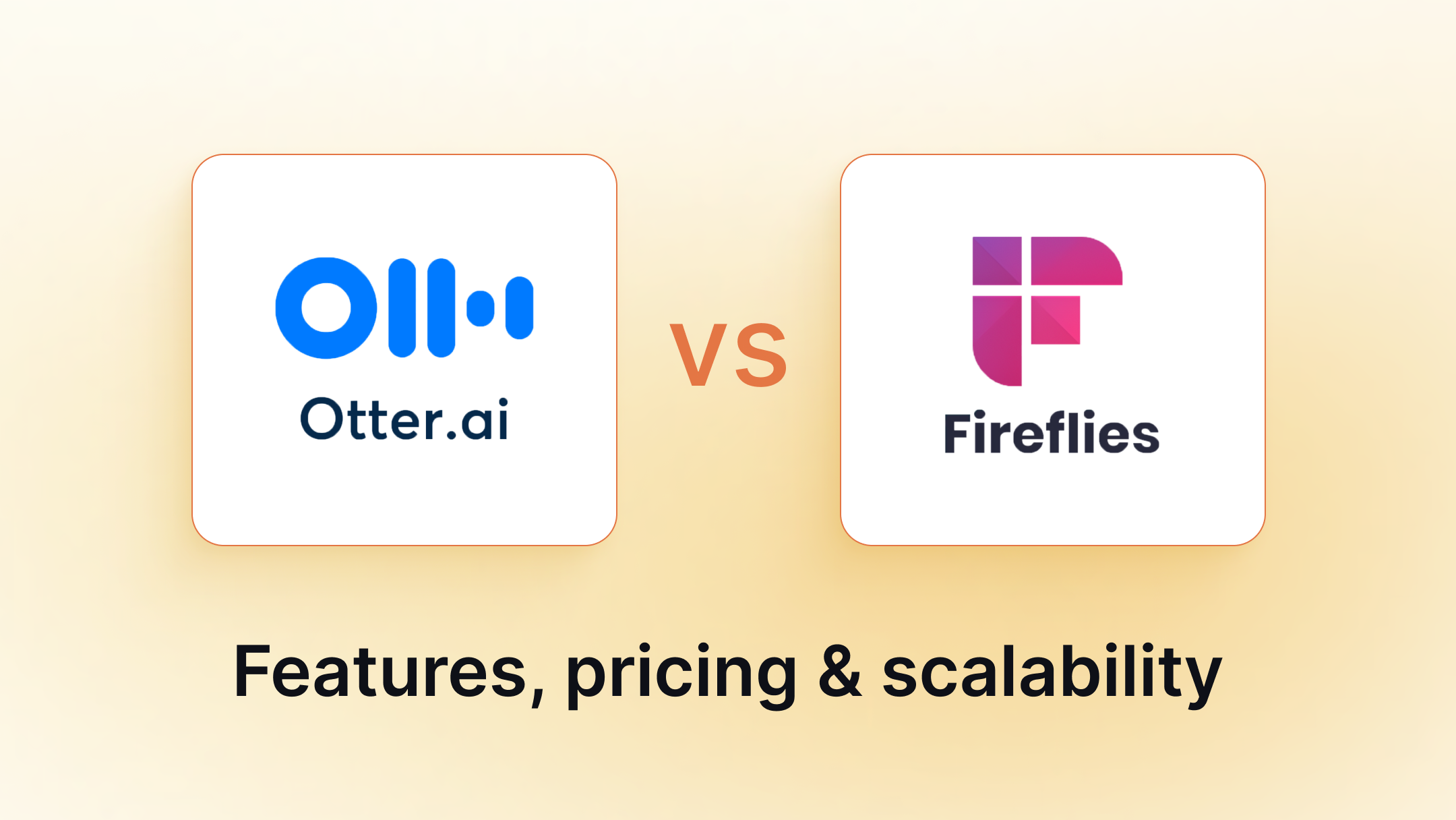
If you’re comparing Otter and Fireflies, you already know manual notes don’t cut it. The real question: which tool fits your workflow today and which will still work as your needs grow?
That’s where transcription tools like Otter and Fireflies come in. To ground the comparison across common meeting scenarios (Sales, CS, recruiting), we’ll also touch on platforms such as Google Meet and Microsoft Teams, security like SAML-based SSO, and technical factors like transcription accuracy, speech recognition, and speaker recognition.
Key differences between Otter.ai and Fireflies.ai
Otter.ai is a meeting assistant that uses artificial intelligence to generate transcriptions for meetings, interviews, lectures, and other important voice conversations.
Fireflies, on the other hand, is an AI assistant for meetings that records, transcribes, and offers search capabilities across your meeting transcripts.
While both these tools offer transcriptions, you may be wondering:
- Why is Fireflies an AI meeting assistant and not classified as a transcription tool like Otter?
- What’s the difference between a transcription tool and a meeting assistant?
- Which one is objectively better?
If you're also wondering about these questions and feeling confused, you're not alone. That's why we have written this article to help you get answers to those questions and get clarity to decide which tool is the best fit for your needs.
TL;DR: Otter is a good fit if you need affordable, reliable transcription for individual use, while Fireflies adds summaries, integrations, and team collaboration features.
Both plateau quickly, as neither provides structured notes, coaching insights, or revenue intelligence. Before we dive into the detailed comparison, it helps to step back and understand the categories themselves. Otter and Fireflies may look similar on the surface, but one is rooted in transcription while the other positions itself as a meeting assistant, and that distinction shapes what each tool can (and can’t) do for you.
How is a meeting transcription tool different from a meeting assistant?
For a casual observer, it might not seem like there is much difference between a transcription tool and a meeting assistant. However, several aspects can make a world of difference to your everyday use cases.
What is a meeting transcription tool?
A transcription tool is typically AI-powered and uses automated speech and language technology to record and transcribe spoken conversations into written texts. Many tools also support live transcription, offline transcription, video/audio uploads, and custom vocabulary to improve accuracy.
A transcription tool offers the following advantages:
- Saves time from manually transcribing meeting notes
- Offers a convenient and cost-effective way to convert audio into text
- The transcripts are scalable compared to doing it manually
- Helps you focus on the meeting conversations actively instead of shifting focus between taking notes and conversing
- Helps easy recall and review
What is a meeting assistant tool?
Meeting assistants definitely offer way more than transcription apps because they help you with many other aspects before, during, and after a meeting.
Here are some advantages that a meeting assistant software offers:
- Eliminates the need for additional third-party integrations for basic capture
- Helps save at least 40% of your time before and after the meetings
- Creates meeting highlights, action items, and automated meeting summaries
- Eliminates biases in meeting notes and summary
- Boosts individual and team productivity and improves the overall meeting experience
Understanding the difference between a simple transcription tool and a full meeting assistant sets the stage for evaluating Otter and Fireflies. Both started with transcription at their core, but each has evolved in different ways: one leaning toward individual productivity, the other toward team collaboration.
So how do you decide which one fits your needs today, and which can keep up as those needs grow? Let’s break it down.
How to choose between Otter and Fireflies?
The short answer: your decision comes down to features, pricing, and scalability.
1. Product functionality
When you are evaluating between products, one of the first things to look for is how comprehensive and comparable their functionalities are.
Some questions to consider:
- How do they stack up in terms of product functionality and features?
- Does it cater to your specific requirements like your preferred meeting or video platform?
- Are they well integrated with other software you use in your organization like Google Docs, CRM, chat, etc.?
- Do they support native integration or third-party API connectors?
- How responsive is their customer support?
2. Pricing
Pricing is another key aspect to consider (though not the most important one) when you are evaluating a tool for your long-term use. The point is, you want to buy an affordable solution that is also the best of breed.
Some questions to consider:
- Does it offer a free trial or freemium plans?
- Does it have flexible, cost-effective monthly, half-yearly, and annual plans?
- Do the pricing plans make sense for your use cases and organization size?
- Are there any additional or hidden costs?
3. Scalability
Buying software is a future-oriented action. You almost always have to consider its usage and effectiveness for the days to come. While today a specific solution might serve your current needs, you always need to think and evaluate the tool based on how it might fit into your future business needs.
Some questions to consider:
- What are your current and probable future use cases? Does the tool accommodate them all?
- Will this tool scale to other functions in the organization if the need arises for the Product, Marketing, or Recruiting teams to record and transcribe their meetings?
- How costly are their plans when you add new users to your team?
Now let’s compare Otter and Fireflies point-by-point.
Evaluating Otter.ai and Fireflies.ai: A step-by-step comparison
So, should you go for Otter or Fireflies? It depends on your use case. If you only need accurate transcripts for personal notes, Otter can be a simple fit. If you work in a team and want searchable transcripts with AI-generated summaries, Fireflies may feel more useful.
But if your needs go beyond just capturing conversations, if you want structured notes, coaching insights, and revenue and deal intelligence that scales across functions, then neither tool is enough.
To help you make an informed choice, let’s break the comparison down into the three factors that matter most: features, pricing, and scalability.
Otter.ai review
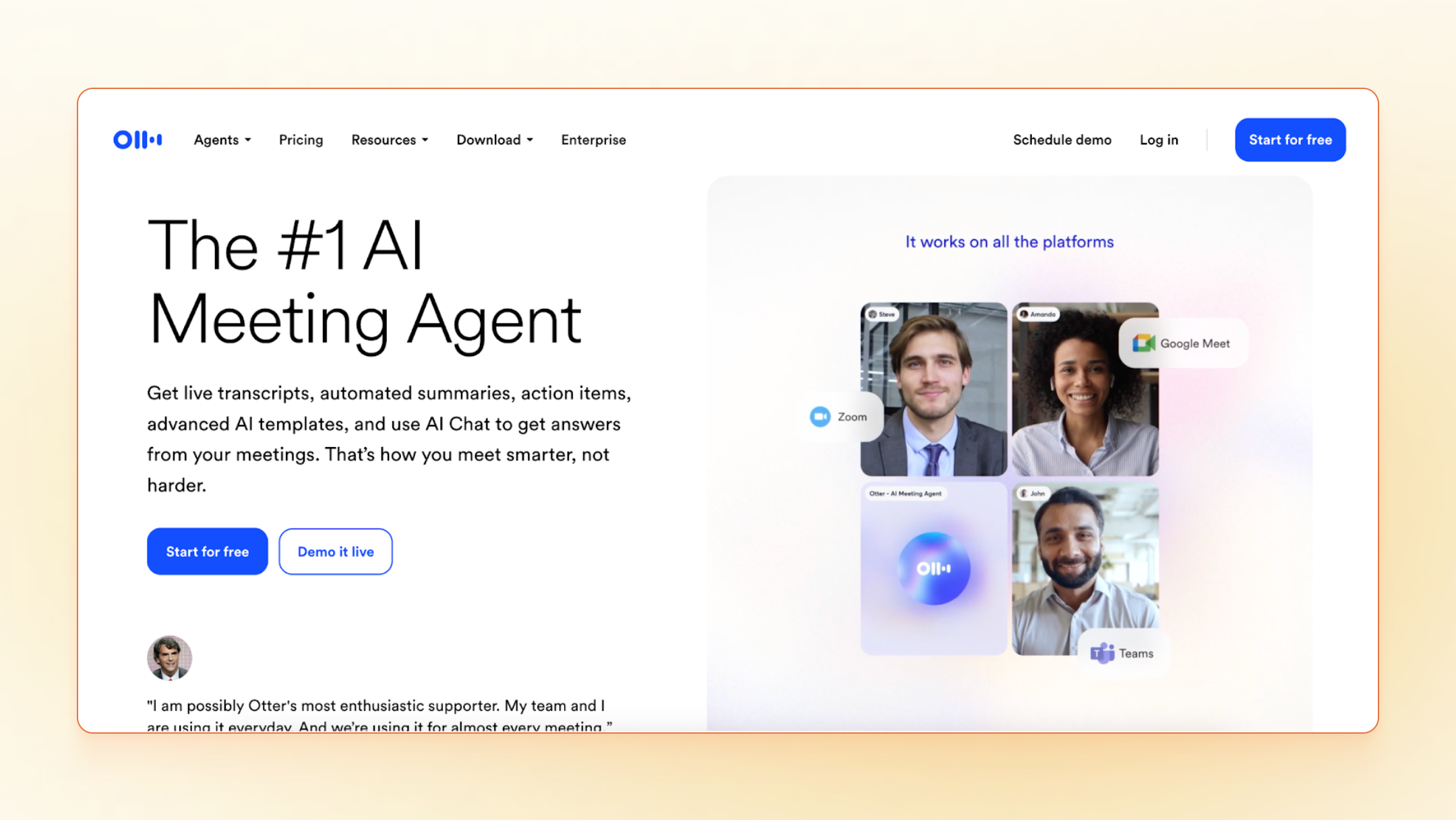
Otter.ai may have started as a pure-play transcription app, but today it offers more than just transcripts. It provides real-time transcription, meeting summaries, basic speaker analytics (talk-time, filler words, etc.), and even copy/paste follow-up notes.
That said, Otter is still audio-only (no video recording), and its collaboration remains lightweight compared to full-fledged assistants, with no advanced conversation intelligence, revenue insights, and with limited third-party integrations.
Otter.ai features
Otter started as a transcription app and still does that well. It reliably converts meeting audio into text with clear speaker identification. Like all transcription tools, it can falter when multiple people talk at once, but overall, its accuracy is solid.
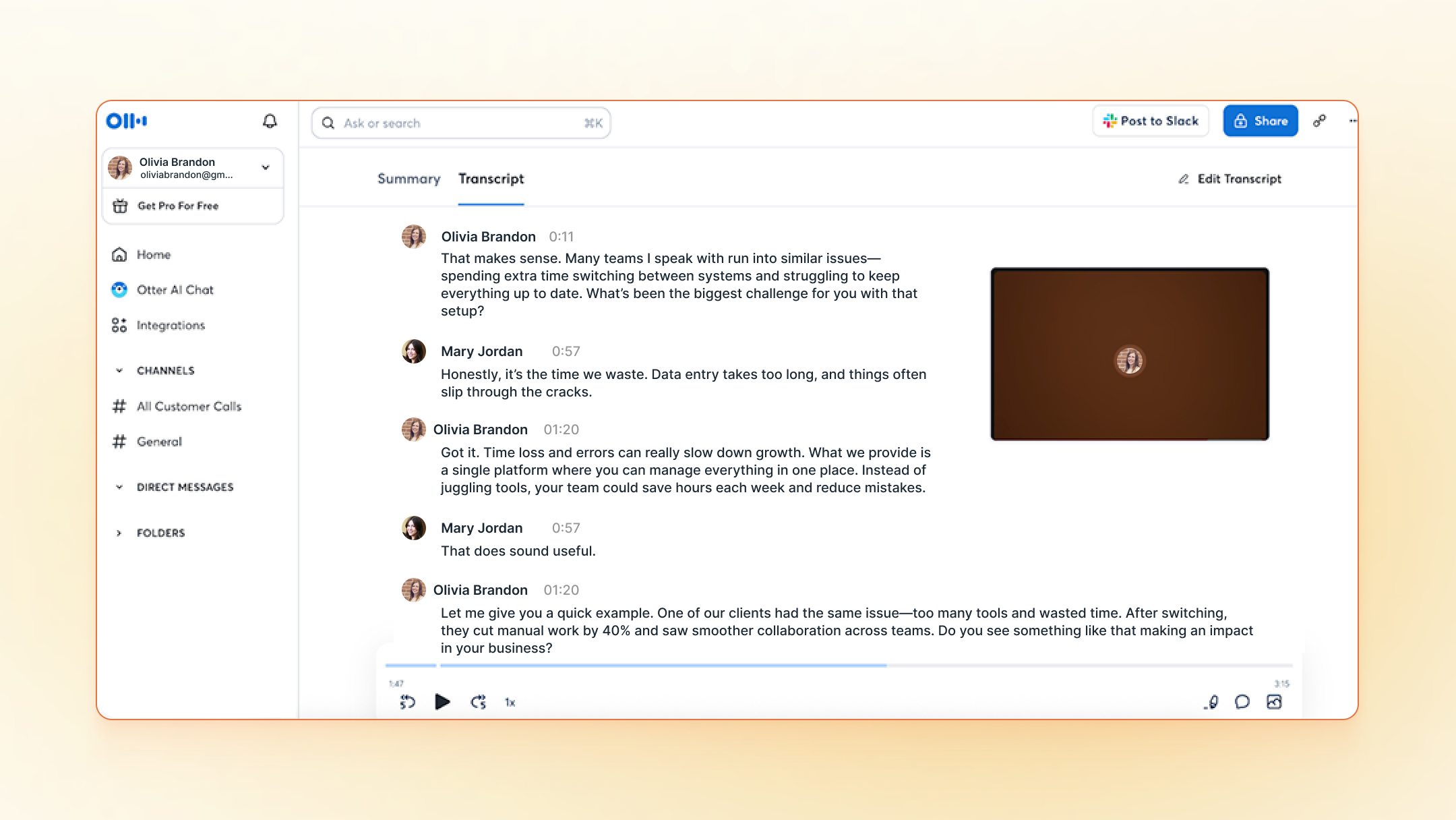
Transcripts can be edited, played back at different speeds, synced with Google Docs.
Otter notes let you capture quick highlights, to-dos, and context alongside the transcript, and share or export them with your team.
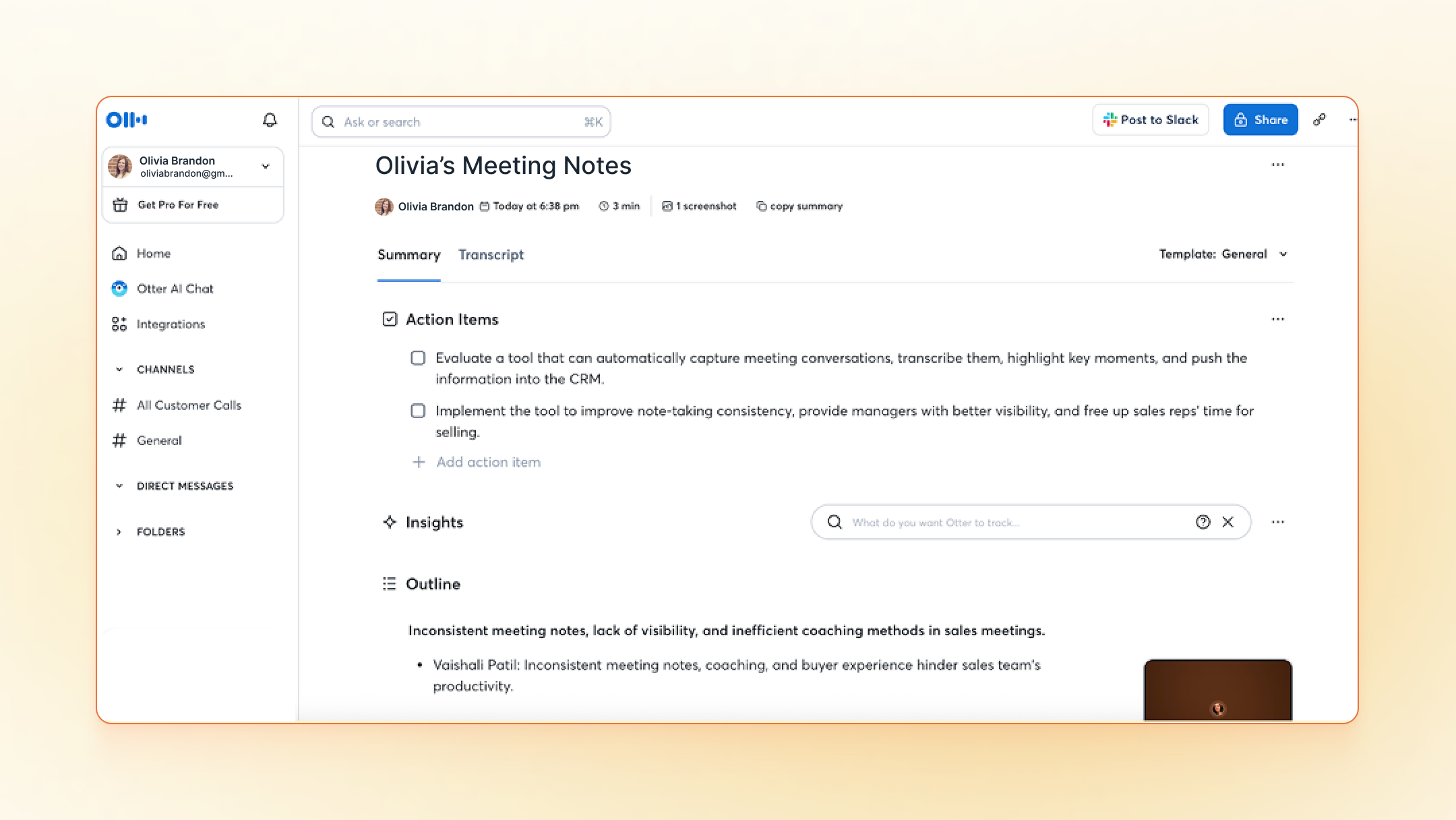
It also supports keyword tracking and privacy safeguards, with an Otter Chat for querying conversations.
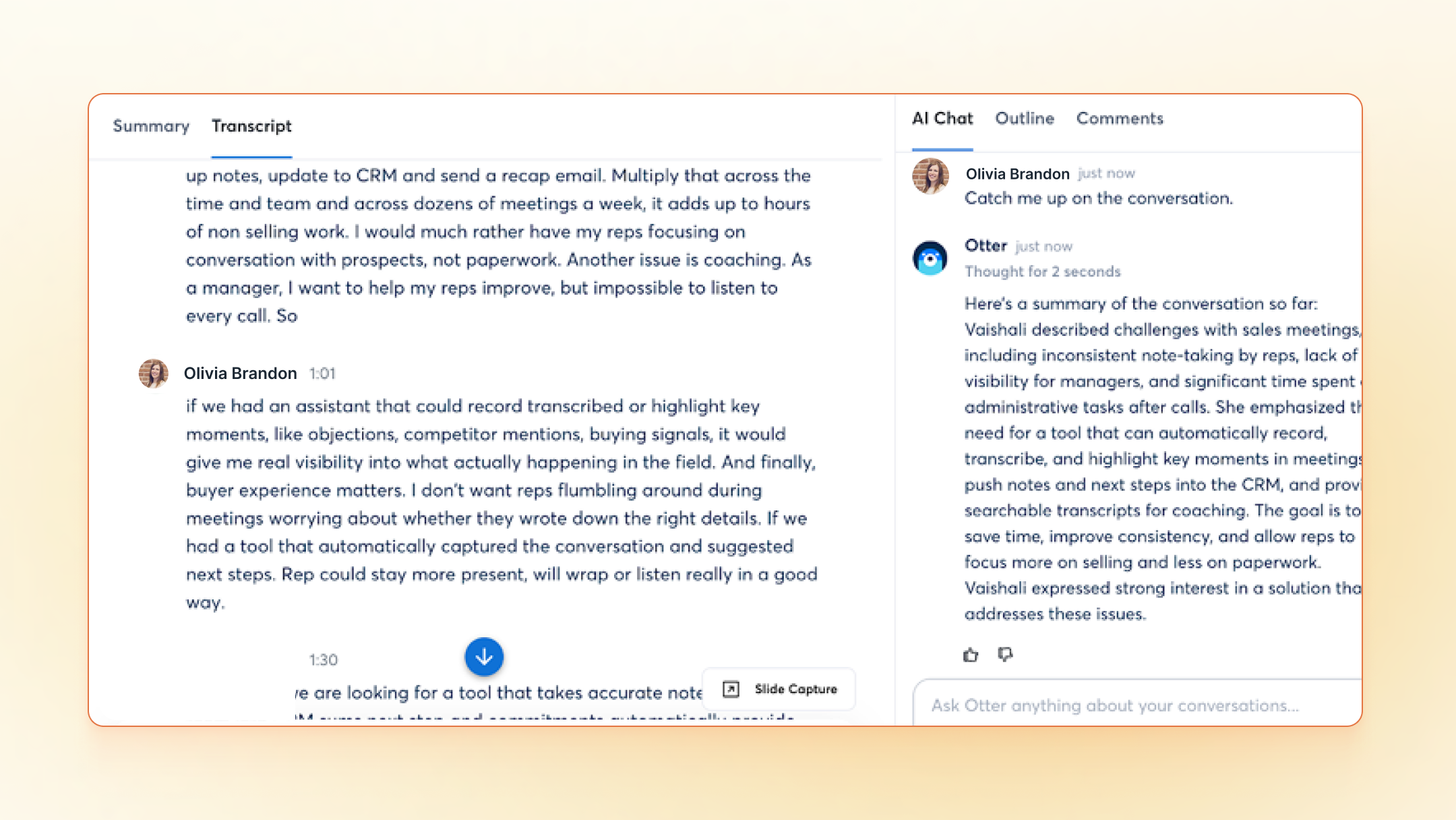
However, Otter is still audio-only and doesn’t extend into deep conversational intelligence or deal intelligence. It’s best for individuals or small teams that need dependable capture with a touch of AI assistance, especially on Google Meet or Microsoft Teams calls.
Otter.ai pricing
Otter offers four plans:
- Basic (Free): Includes 300 transcription minutes per month, live transcription for Zoom, Google Meet, and MS Teams, plus mobile app access. Limited to 3 lifetime file imports and 30 minutes per conversation.
- Pro ($8.33/user/month, billed annually): Expands to 1,200 minutes per month, up to 90 minutes per meeting, 10 monthly file imports, and adds features like advanced search, templates, and Zapier integration.
- Business ($20/user/month, billed annually): Designed for larger teams, with 6,000 monthly import minutes, 4-hour meetings, unlimited storage, analytics, concurrent meeting joins, and admin controls.
- Enterprise (Custom pricing): Adds enterprise-grade features such as SSO, domain capture, HIPAA compliance, CRM integrations, and a dedicated Customer Success Manager.
All paid tiers support unlimited real-time recordings and collaboration, with pricing charged per user. However, transcription time per conversation is capped, and concurrent meeting joins are also limited.
Otter.ai scalability
Otter scales well for individuals and small teams that need more transcripts, more recordings, and more storage. It’s reliable for personal notes, team calls, or repurposing audio from podcasts and brainstorming sessions.
This makes Otter attractive for lightweight use cases. But its caps on meeting length and concurrent sessions quickly become restrictive for teams handling longer customer calls, back-to-back demos, or overlapping meetings. The strict import limits on lower plans, basic export options, and lack of CRM integrations outside of Enterprise further highlight its focus on transcription over workflow. Growing sales teams often outpace these limits fast, pushing them toward platforms that offer more flexible scaling, deeper CRM sync, and advanced revenue workflows.
But Otter’s scalability is limited to volume, not depth. As organizations grow, the need shifts to structured notes, collaboration across functions, and insights tied to business outcomes. Here, Otter plateaus. It remains an audio-only tool with light AI add-ons, without conversation intelligence or revenue intelligence to support larger teams.
Fireflies.ai review
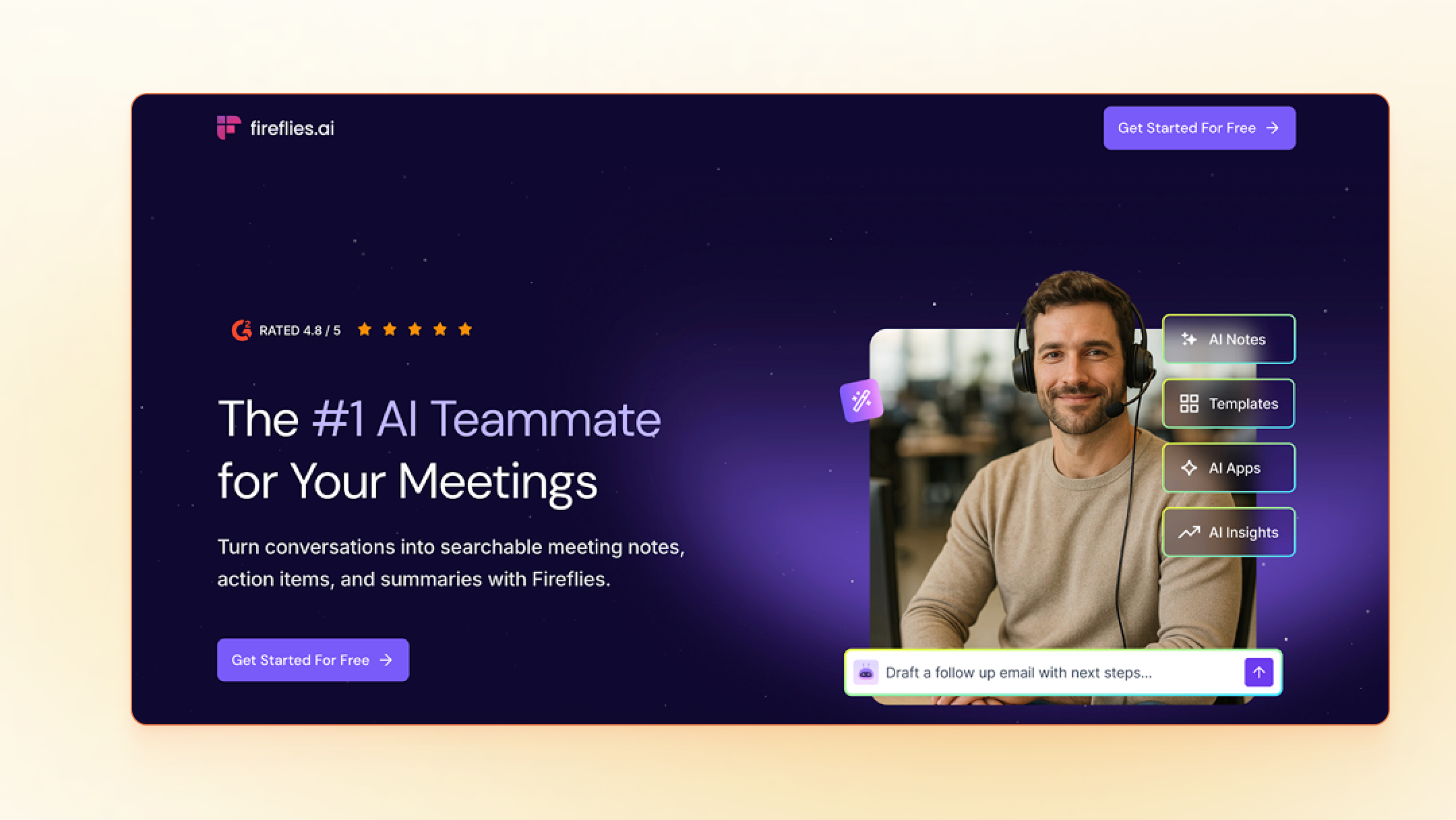
Founded in the same year (2016) as Otter.ai, Fireflies has expanded well beyond transcription. In addition to recording and transcribing, it now generates AI Meeting Summaries with customizable templates, supports Ask Fred (its AI copilot for meeting queries), and integrates with CRMs, Slack, and ClickUp. Its keyword-based topic trackers and transcript search help teams stay organized, though the tracking is limited to exact words rather than concepts. Compared to Avoma, Fireflies offers collaboration-friendly summaries but lacks advanced conversation intelligence features like customizable scorecards, concept-level tracking, or coaching insights.
Fireflies.ai features
Fireflies takes a team-first approach. Once connected to your calendar, its AI bot Fred can automatically join meetings to record and transcribe, or you can choose more granular settings, like only having Fred join meetings you own, or inviting fred@fireflies.ai manually for specific calls. You also control how widely meeting recaps are shared.
Inside the Notepad within your Fireflies Notebook, you can review transcripts, leave comments, create Soundbites, and adjust playback.
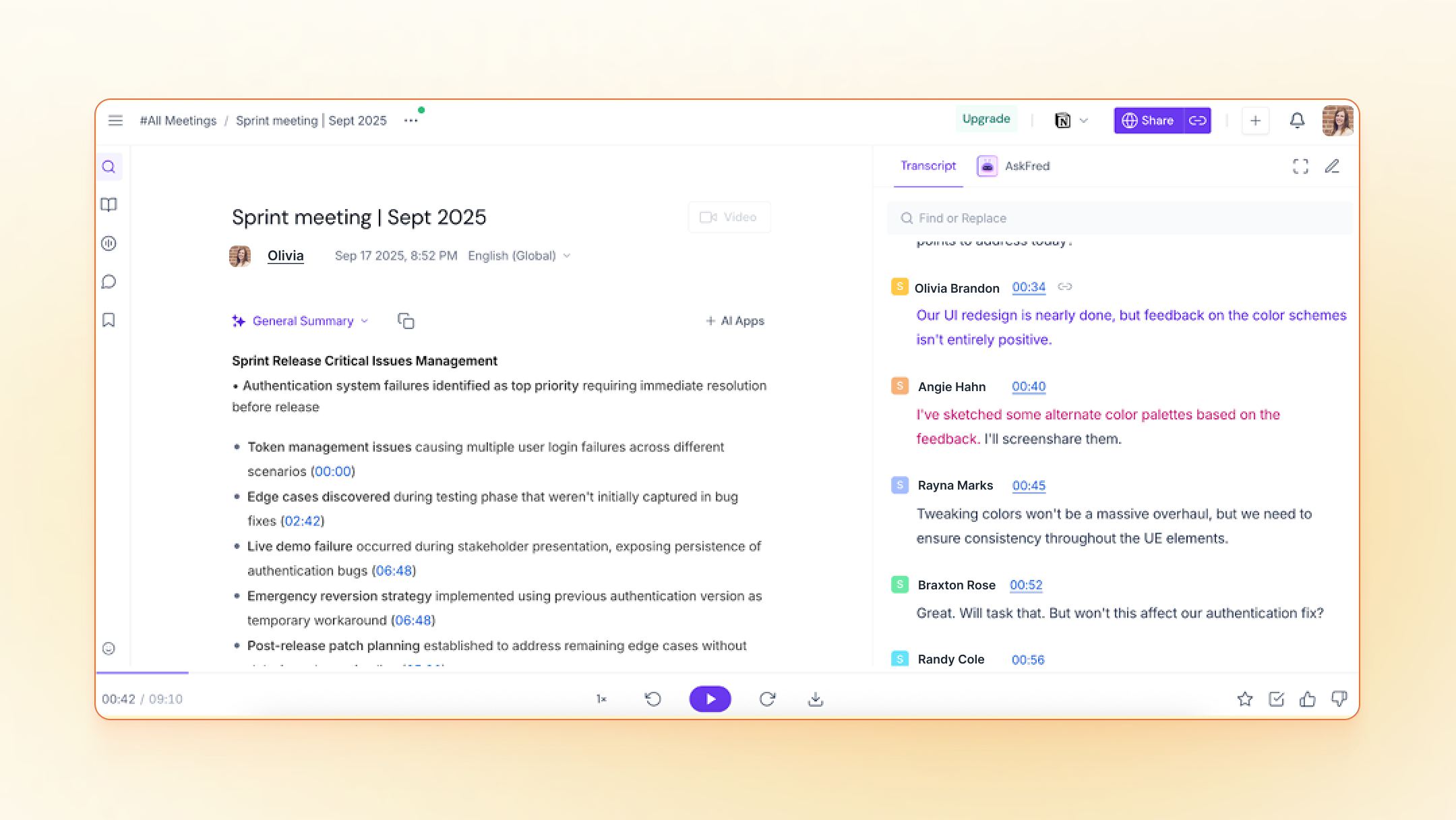
Fireflies has also expanded beyond transcription: it now offers AI Meeting Summaries with customizable templates.
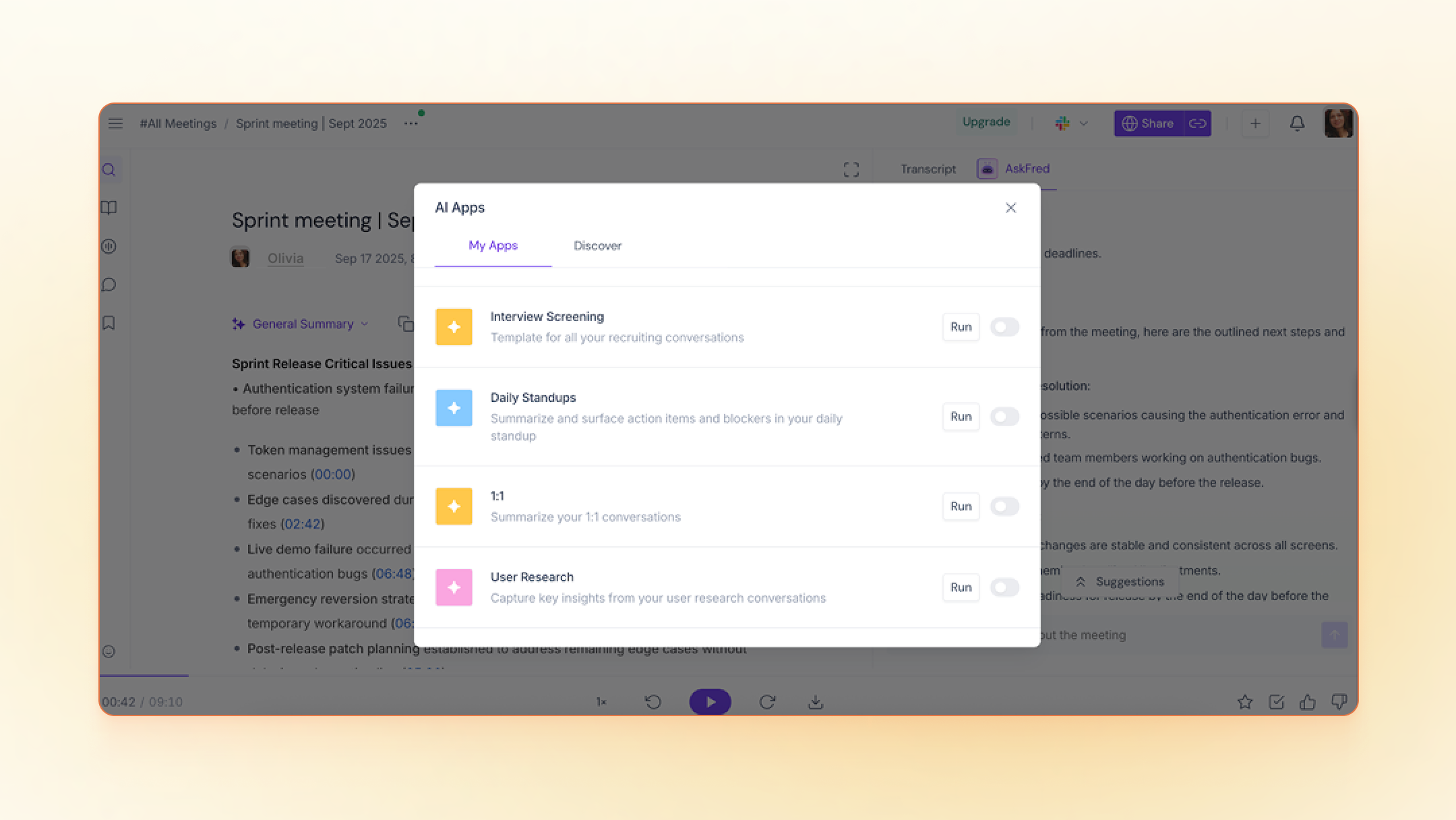
AskFred as a meeting copilot and Global AskFred lets you query across all past meetings in one place.
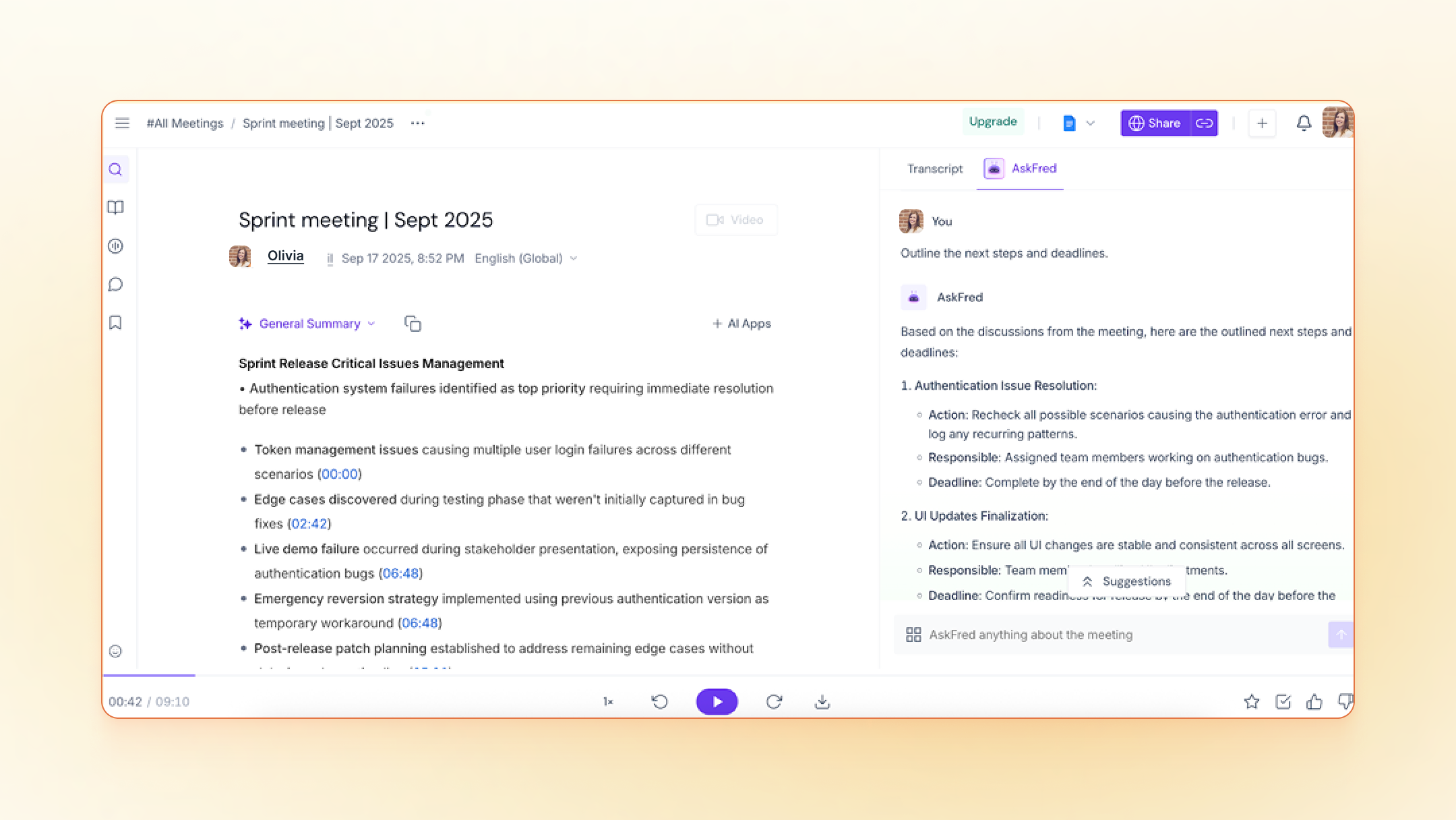
The platform supports transcription and summaries in 100+ languages, with language selection available per meeting.
Other productivity features include keyword-based Topic Trackers, integrations with tools like Slack and ClickUp, and one-way CRM logging that pushes notes and transcripts into systems such as Salesforce and HubSpot.
That said, Fireflies’ limitations are clear: tracking is keyword-only, CRM sync is one-directional, and there are no built-in coaching insights, scorecards, or revenue intelligence. It works well for teams that want searchable transcripts and post-meeting recaps, but it stops short of delivering the deeper analytics and business impact insights that growing organizations often require.
Fireflies.ai pricing
Fireflies offers four tiers:
- Free (Forever): Includes unlimited transcription (with storage capped at 800 minutes per seat), limited AI summaries, 2-hour recording limits, and access to AskFred in a restricted capacity.
- Pro ($10/seat/month, billed annually): Expands storage to 8,000 minutes per seat, unlocks unlimited AI summaries, download options for transcripts and recordings, talk-time analytics, AI apps, task manager, and unlimited integrations. Max recording length remains 2 hours.
- Business ($19/seat/month, billed annually): Adds unlimited storage, video recording, conversation intelligence, sentiment analysis, and team analytics for admins. Recording length increases to 3 hours per meeting.
- Enterprise ($39/seat/month, billed annually): Includes everything in Business plus advanced controls like a rules engine, SSO, HIPAA compliance, private storage, custom data retention, super admin role, and dedicated account management. Recording length extends to 4 hours.
All paid plans support unlimited transcription and AI summaries, but note that meeting duration caps (2–4 hours depending on plan) and storage limits on Free/Pro tiers may affect usability for heavier workflows.
Fireflies.ai scalability
Fireflies takes scalability a step further with unlimited transcription across paid tiers, AI summaries, support for 100+ languages, and integrations with tools like Slack, ClickUp, and CRMs. For small to mid-sized teams, this breadth makes it easy to share, search, and collaborate on meeting notes without worrying about transcription limits.
Still, Fireflies scales more in features offered than in depth of capability. Recording length is capped at 2 hours on Pro, 3 hours on Business, and 4 hours even on Enterprise, which can constrain longer workshops or multi-hour customer calls. Storage is limited on the Free and Pro tiers, and while CRM sync exists, it’s primarily one-way logging of notes and transcripts. Topic tracking is restricted to exact keywords, and there are no coaching insights, scorecards, or revenue intelligence features. As teams grow and depend on deeper analytics, cross-meeting insights, and richer CRM workflows, Fireflies hits a ceiling in much the same way Otter does.
Beyond transcription: Where Otter.ai and Fireflies.ai fall short
Otter and Fireflies have evolved from simple note-takers into broader meeting assistants, but both remain lightweight compared to what modern, cross-functional teams demand.
Truly actionable notes: Otter provides automated meeting summaries with highlights, action items, and outlines, and higher tiers support custom meeting-type templates. Fireflies generates unlimited AI summaries on paid plans, but these stay fairly generic and can’t be tailored by role. Neither platform delivers structured, role-specific outputs aligned with Sales, CS, or Recruiting the way Avoma’s Smart Templates do.
Deeper intelligence: Fireflies offers keyword-based Topic Trackers, one-way CRM logging, and conversation-intelligence dashboards for admins. Otter’s analysis stops at transcripts, search, and summaries. Both lack customizable scorecards, real-time coaching recommendations, or concept-level tracking — the intelligence that actually helps teams sharpen performance.
Business impact insights: Otter caps meetings at 90 minutes on Pro and 4 hours on Business/Enterprise, while Fireflies ranges from 2 hours on Pro up to 4 hours on Enterprise. Those limits often cut off longer workshops or customer calls. More importantly, neither platform connects conversations to outcomes. They don’t surface deal risks, churn signals, or pipeline health. Avoma does — delivering conversation and revenue intelligence that ties every meeting directly to business results.
Why Avoma is the smarter alternative to Otter and Fireflies
Otter and Fireflies help with transcripts and summaries, but Avoma is built as a full meeting lifecycle platform that goes far deeper into workflows and revenue impact. Instead of stitching together multiple tools, you get everything in one place:
- Meeting Assistant: Schedule or route leads, record video and audio, transcribe in real time, and generate structured AI notes and follow-ups.
- Collaboration: Search transcripts, highlight and share key moments, and co-edit notes live with unlimited free view-only users.
- Smart Templates & Custom AI Notes: Role-specific note templates (for Sales, CS, Recruiting, etc.) that can be tailored per team, ensuring outputs are actionable instead of generic.
- Two-way CRM Sync: Automatically save notes into Salesforce, HubSpot, Zoho, and more and pull CRM context back into meetings for richer preparation and follow-up.
- Lead Router (Add-on): Advanced routing rules for inbound qualification, SDR-to-AE handoffs, and round-robin scheduling.
- Conversation Intelligence (Add-on): AI coaching, automated call scoring, talk-pattern insights, and smart trackers.
- Revenue Intelligence (Add-on): Deal risk alerts, churn signals, pipeline dashboards, and AI-driven forecasting.
Avoma pricing is designed to scale
- Startup ($19/recorder seat/month): Unlimited Meeting Assistant, video recording, transcription, AI notes, 1:1 scheduling, and CRM sync.
- Organization ($29/recorder seat/month): Adds custom AI notes, Smart Templates, group scheduling, playlists, translations, and limited conversation intelligence.
- Enterprise ($39/recorder seat/month): Compliance-first with HIPAA, SSO, advanced controls, and concierge onboarding.
- Add-ons ($29/seat each): Conversation Intelligence and Revenue Intelligence, purchased only for the users who need them.
With Avoma, you turn your meetings into structured, role-specific insights that drive pipeline, customer success, and product strategy.
Otter vs Fireflies: Final verdict
If you’re choosing between Otter and Fireflies, the real question isn’t whether AI note-taking is better than manual notes, that much is obvious. The real question is how far you need your meeting assistant to go.
- Otter is a fit if you want affordable, reliable transcription for personal use or lightweight team capture.
- Fireflies extends that with unlimited transcription on paid plans, AI summaries, and collaboration features that work well for small to mid-sized teams.
But both plateau quickly. Otter caps meeting length and imports, Fireflies caps recording time and relies on keyword-only tracking. Neither delivers structured, role-specific outputs, coaching insights, or revenue intelligence that ties conversations directly to business outcomes.
That’s where Avoma comes in. Avoma isn’t just another note-taker, it’s an end-to-end meeting lifecycle platform. You get scheduling, recording, transcription, and instant notes in every plan, with Custom AI Notes & Topics that adapt to Sales, CS, Recruiting, and more. Add-ons for conversation and revenue intelligence unlock coaching, pipeline health, and deal insights when your team is ready. With two-way CRM sync and unlimited free viewer seats, Avoma scales in both volume and depth, ensuring your meetings don’t just get captured, they drive measurable business impact.
Frequently Asked Questions
A transcription tool converts spoken audio into text with speaker labels. A meeting assistant does that plus adds features like AI summaries, action items, collaboration, integrations, and in advanced platforms, conversation or revenue intelligence.
Yes. Fireflies supports transcription and summaries in 100+ languages. Otter supports transcription in English, French, and Spanish, with summaries available in English.
Yes. Both provide live transcription during meetings. Fireflies also supports post-meeting transcription of uploaded audio or video files.
Accuracy varies by accent, background noise, and meeting conditions. Many users note Fireflies performs better with diverse speakers, while Otter is strong for English-centric use cases. Both may struggle with heavy overlap or jargon.
Otter is well-suited for individuals or small teams who need affordable transcription with light AI features. Fireflies offers more for teams — summaries, searchable transcripts, multi-language support, and integrations with Slack, ClickUp, and CRMs.
Otter’s paid plans start at $8.33/user/month (Pro) and scale to $20/user/month (Business), with custom Enterprise pricing. Fireflies’ paid plans start at $10/seat/month and scale to $39/seat/month for Enterprise. Both also have free forever plans.
No. Fireflies markets “conversation intelligence” (talk-time analytics, sentiment, topic detection), but neither offers full conversation intelligence or revenue intelligence such as coaching scorecards, deal risk, or churn signals.
Both scale for higher volumes of transcription, but plateau when organizations need deeper value like structured notes, two-way CRM sync, coaching insights, or pipeline intelligence. Avoma is designed to scale in both volume and depth.
Avoma combines meeting capture with Instant Notes, Custom AI Notes & Topics, conversation intelligence, and revenue intelligence. It ties meetings directly to business outcomes with coaching recommendations, deal insights, and pipeline visibility.
Choose Otter for simple, affordable transcription. Choose Fireflies if you want team-friendly transcripts, summaries, and broad integrations. Choose Avoma if you need a platform that goes beyond capture — delivering structured notes, coaching insights, and revenue intelligence that scales across teams.






What's stopping you from turning every conversation into actionable insights?



